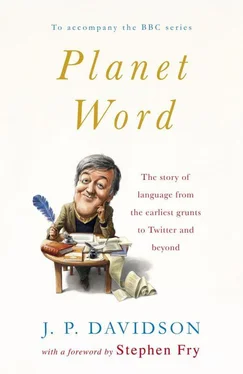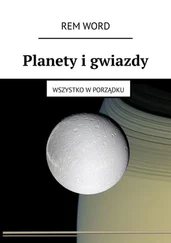odd ) will be offended by the word. I cannot, however, write the word that begins with
N and rhymes with ‘Tigger’ without blushing to my roots and fearing for my reputation. Some call this ‘political correctness’. They are, in my estimation, deluded: their sense of language seems to be defined by the asininities of the worst of the bourgeois tabloids. Verbal taboos are far too interesting and complex to be fobbed off as fashionable liberal courtesies or even as simply ‘good manners’.
If we can’t tell the world anything new about language, why should we make the effort to produce five hours’ worth of television and a big handsome book to accompany it? Because the questions that language raises are so much more eternally fascinating, revealing and beguiling than any theoretical answers and because, narratively speaking, as J. P. Davidson demonstrates in the following pages and as I hope we all demonstrated in the making of our programmes, showing is so much more interesting than telling.
Perhaps the biggest discovery I made, or at least the feeling I already had that was most heavily reinforced, was to do with language and identity. We may be what we eat, but we most certainly are what we say. Which is not to say I am taking sides on the schism I referred to earlier. All who know a little about linguistics will be aware of the Sapir — Whorf Hypothesis on the one hand and the Chomskian ideas of ‘generative grammar’ (the automatic innateness of language that is as programmed and predictable in its growth in a toddler as the arrival of hair is in the armpits of an adolescent) and the assertion that all languages, when it comes down to the essentials, are similar almost to the point of congruency. Against this is pitted the Whorfian notion that the very nature of the distinct language we speak determines, to a greater or lesser extent, the way we think or the way we see and interpret the world around us. The Chomskian view, as expressed so fluently, accessibly and convincingly by Steven Pinker, has held sway with academia for decades, but some research appears to have chipped away at the marmoreal smoothness of its surface lately. Wholly fascinating as this area of inquiry is, my sense of language as identity is more to do with the short time I spent among the Turkana in Kenya, the Akha in Thailand, the Basques of Spain and France and Irish-speakers in the Gaeltacht.
Our individual language may or may not limit or widen our thought according to its breadth of vocabulary, elasticity of structure or complexity of syntax, but it seems most certainly to place us in the world like no other property or quality we possess. In our limited and foolish way, we may think skin colour a greater determinant of identity, but an Ibo would feel no more in common with a Jamaican, I submit, than he would with me.
It so happened that I was in Kenya at the time of Barack Obama’s election as president. I spoke to a member of the Luo tribe, from which Obama’s father came, and asked if he was pleased that America should not only now have a black president, but one from his people. ‘Very pleased of course,’ came the reply, ‘but you should consider that had Mr Obama been elected president of Kenya, he would have been our first white president.’ Our confusion, inconsistency and insanity when it comes to labelling people as black when they are half or even three-quarters white, may one day, it is to be hoped, resolve itself into sense. True identity, aside from the very personal individual qualities, the DNA and parentage that separate all humans each from the other, resides in one cultural marker above all: language.
In the course of our travels I met in Beijing the most influential linguist who ever lived. One hundred and six years old, his first words to me were, ‘You will have to forgive me, my English is a little rusty these days.’ He modestly repudiated my claims for his place in world history, but I believe them nonetheless. He is the reason, incidentally, that we now write ‘Beijing’ and not ‘Peking’. In London I underwent MRI trials that tried to locate the areas of my brain that were responsible for different types of conscious and automatic utterance. In Victoria, Australia, I attempted to get my befuddled mind around the absolute directional concepts built into the language of the Aboriginal people of Pormpuraaw. In Jerusalem I came as close to handling a fragment of the Dead Sea Scrolls as any human being can (only four in the world are allowed that actual privilege) and at the Max Planck Institute in Leipzig I had dung hurled at me by gorillas. I narrowly avoided smoking an opium pipe and eating curried dog on the borders of Thailand and Myanmar, and helped prepare a Basque-style, Michelin three-star lunch in San Sebastián. If you feel a tinge of envy, or something stronger, I cannot blame you. It was the gig of a lifetime and I am fully aware that it is no use my saying that it was very hard work, that the days were exhausting and the living conditions often atrocious. I am a lucky, lucky devil to have had such an opportunity.
I mentioned that language was, in my estimation, our clearest indicator of culture. Perhaps food comes a close second. The analogy holds at many levels. Just as one kind of cheap Western catering in the form of burgers, fried chicken and fizzy cola swamps towns and cities the world over, threatening natural indigenous cuisines, so one kind of English seems to be doing the same to minority languages. But, in a positive and countervailing manner, just as our bland English cuisine has been enriched, coloured and spiced by foreign influences from the world over, so too has our language. When families and individuals express their sense of who they are, it is as much through their mother’s cooking as their mother tongue.
Whoever you are, whatever your provenance, however you came to be in the position you are now in, with this book or digital device in your hand, you can read and speak. What is more, the language you read and speak, while universally understood and given descriptive (but not prescriptive or proscriptive) grammatical rules and semantic definitions, is at one and the same time entirely your own and that of your clan, your tribe, your nation and your people. The way you speak is who you are and the tones of your voice and the tricks of your emailing and tweeting and letter-writing can be recognized unmistakably in the minds of those who know and love you.
I sometimes wonder if Alexander Pope should not have written that the proper study of mankind is language .
There was the television series, and now here in your hands is the book that celebrates language. Skip about or read it from first page to the last. We hope it will delight you and perhaps make you think afresh about the free, inexhaustible and delicious resource that lies somewhere in your brain and allows you to be who you are.
But next time you speak or write, do not try to work out what is going on socially, culturally, neurally, intellectually or physiologically. The effort is beyond us all and you might just explode. Instead … celebrate .
Chapter 1
Tower of Babel (Mary Evans Picture Library)
Ambam (J. P. Davidson)
Toby the Sapient Pig (Mary Evans Picture Library)
Hans the Counting Horse (Mary Evans Picture Library)
Navy-trained dolphin (Photo by Evening Standard/Getty Images)
Nim Chimpsky (Susan Kuklin/Science Photo Library)
Brain diagram (National Institute on Deafness and Other Communication Disorders, www.nidcd.nih.gov)
Noam Chomsky (Photo by Ulf Andersen/Getty Images)
FoxP2 gene (Ramon Andrade 3Dciencia/Science Photo Library)
Steven Pinker (Photograph by Francesco Guidicini, Camera Press London)
Читать дальше












